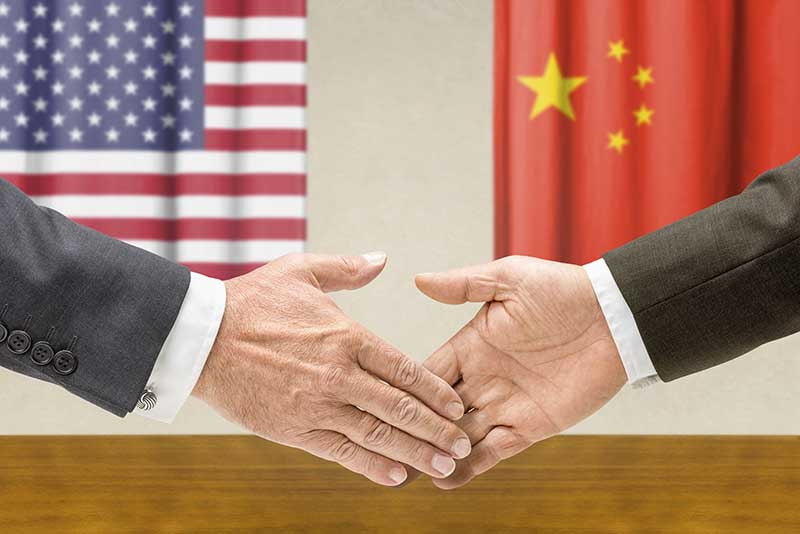Media Report

- The New York Times reports: "In his first telephone conversation with President Xi Jinping of China, Mr. Trump, now the president-elect, appeared to set aside [his] critiques expressed on the campaign trail, vowing that the two nations would have 'one of the strongest relationships,' according to a statement released by Mr. Trump's transition office, Reuters reported. Mr. Xi, in turn, told Mr. Trump that 'facts have shown that cooperation is the only correct choice' for the United States and China, according to Xinhua, the Chinese state news agency. In the phone call, which took place on Monday Beijing time, the two men agreed to maintain close communications and to meet at an early date...'He's very different from the Obama administration when it comes to issues like trade and economics,' Mr. Li [dean of the School of International Relations and Diplomacy at Beijing Foreign Studies University] said. 'There's still a lot of uncertainty."
- The Associated Press reports: "As a surge of students from China begins to level off, many U.S. colleges are expanding recruiting efforts in the Middle East, South Asia and Latin America in part to boost budgets that have come to rely on tuition dollars from international students....'For a variety of factors, we're seeing a slowdown in Chinese enrollment," said Todd Maurer, a California analyst who advises schools and education companies on trends in Asia. "I think we're seeing the last years of double-digit growth.' Colleges seek international students partly to boost campus diversity, but they also bring a financial perk. Most schools don't offer scholarships for international students, and charge them full tuition costs...Stephen Dunnett, vice provost for international education at the University at Buffalo, said many colleges worry they depend too heavily on revenue from Chinese students. 'They would be severely hurt if there was a contraction,' he said. 'There's no Plan B. There's no other country that would send students in those numbers."
- The Wall Street Journal reports: "President-elect Donald Trump's promised trade tariffs on China would likely hurt U.S. allies Japan and South Korea, which have become increasingly dependent on the Chinese market. Mr. Trump vowed to slap a 45% tariff on all imports from China if it doesn't alter practices such as subsidizing steel and other industries, and to pull the plug on a Trans-Pacific Partnership, or TPP, a 12-nation free-trade accord encompassing America's chief Asian allies. The accord effectively died Friday, and Obama administration officials acknowledged there is now no way to advance it...It is far from clear how much of Mr. Trump's campaign rhetoric will become policy. Many observers have suggested the 70-year-old real-estate tycoon may simply use his threats of big tariff increases to negotiate smaller concessions. They cite the fact that higher tariffs on Chinese goods would mean U.S. consumers paying more for clothing and electronics. 'My guess is there will be some negotiations or renegotiations, but we will avoid the most extreme outcomes, though the long-term tendency is toward increased protectionism,' HSBC economist Joseph Incalcaterra said."
Calendar
- 2016-11-13 Chinese Coaches Hone Their Skills in America
- 2016-11-11 Who Wins a Trade War? China
- 2016-11-10 Donald Trump is a mixed blessing for Chinese leaders
- 2016-11-09 In Trump Win, China Hopes for U.S. Retreat
- 2016-11-08 The Latest: US Upset Over China's Hong Kong Intervention
- 2016-11-07 The coming clash with China over North Korea
- 2016-11-06 China Says Two Elected Hong Kong Lawmakers Can't Retake Oaths
- 2016-11-04 China’s Wanda Group to Buy Dick Clark Productions for About $1 Billion
- 2016-11-03 China Slowdown Deepens Looming Pension Crisis
- 2016-11-02 Separatist Hong Kong Lawmakers Draw Blunt Response From China
News
- The New York Times Trump and Chinese President Hold Cordial First Phone Call
- The Wall Street Journal Donald Trump's China Trade Stance Could Harm Japan, South Korea
- The Washington Post US colleges look outside China for new foreign students
- The Financial Times Xi Jinping urges Donald Trump to co-operate with China
- The Guardian China threatens to cut sales of iPhones and US cars if 'naive' Trump pursues trade war
- Reuters China October crude oil output drops to lowest since May 2009
- The Financial Times China revives 'comrade' in drive for Communist party discipline
- The New York Times China Seeks to Boost Foreign Enrollment in Colleges
- The Associated Press China's Xi reaffirms US relations in talk with Trump
- Reuters In phone call, China's Xi tells Trump cooperation is only choice
- The Guardian Unfinished bridge reveals broken state of North Korea's alliance with China
- BBC Xi Jinping tells Donald Trump US and China must co-operate
- The Wall Street Journal Chinese Metals Manufacturer Takes Shine to Hollywood
Commentary
- The Wall Street Journal: China Real Time Report China Set to Overtake U.S. as World's Largest Cinema Market
- TIME China Is Rapidly Squandering the Unique Opportunity That Hong Kong Represents
- The Diplomat What to Expect From US Central Asia Policy Under President Trump
- Bloomberg View Asia's Two Giants Still Have the Best Growth Stories
- The Wall Street Journal: China Real Time Report China's Diabetes Problem: From 1% to 10% in 36 Years
- Foreign Policy Will Trump Strike a Grand Bargain With China?
- Quartz China won't buy Boeing planes, iPhones, or US corn if Trump starts a trade war, a state tabloid says
